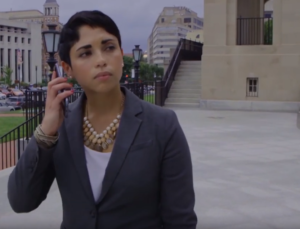Virginia Deportation Defense Attorney
There are a number of ways an individual can be placed into deportation proceedings in Virginia. If a student overstays a status, they become undocumented and could be placed into deportation proceedings. The most common way to be placed into deportation proceedings after Obama’s recent executive action is by committing a criminal offense. Another way someone can be put into a removal proceeding is if they file an affirmative application with USCIS when they are not eligible, or if they apply to naturalize when they have a criminal record that bars them from naturalization. At that point, USCIS reviews their record. If there is something in their past that makes them deportable such as a criminal record or if immigration officials discover the person is not in lawful status or violated their status in some way, USCIS can refer the case to OCC/DHS and the immigration court, who can initiate deportation proceedings. At that point, it is vital to consult with a Virginia deportation defense lawyer, in order to prepare a defense. En Español.
Deportation Hearings
 A notice of hearing is the paper issued by an immigration court that states when and where a person’s first immigration hearing or subsequent immigration hearing takes place. The notice to appear is the charging document. It is the document that states the person’s grounds of inadmissibility or removability depending on what status they are in and pursuant to what sections of law the government believes make them deportable. It outlines the person’s case and informs them about what they need to prepare for their defense in immigration court.
A notice of hearing is the paper issued by an immigration court that states when and where a person’s first immigration hearing or subsequent immigration hearing takes place. The notice to appear is the charging document. It is the document that states the person’s grounds of inadmissibility or removability depending on what status they are in and pursuant to what sections of law the government believes make them deportable. It outlines the person’s case and informs them about what they need to prepare for their defense in immigration court.
Process of Hearings
Removal proceedings are held at immigration courts throughout the United States. The courts are under the EOIR or Executive Office for Immigration Review, which is a subsection of the Department of Justice.
The first appearance is called a master calendar hearing. The person appears in front of a judge with a number of other individuals and makes a pleading on the notice to appear. They will either admit or deny the charges of inadmissibility and state whether they concede removability. They inform the judge how they will be defending themselves, including what legal status and type of defense they believe they are eligible for. Sometimes there can be two, three, or more master calendar hearings, depending on whether or not the person has a NoVa deportation defense attorney at the first hearing or whether they are waiting for a petition to be approved by USCIS.
These cases can be continued for years. If someone has not resolved their status during that master calendar hearing phase of the trial, they are assigned a date for an individual hearing. This is similar to a trial where the person must defend themselves and prove to the judge that they are eligible for some type of lawful status, or litigate a contested issue with the government. This often surprises people, but right now, in Virginia, individual hearings are being set out for 2022, which is more than a five year delay, and the backlog is growing every day.
Failing to Attend a Hearing
If someone fails to attend their deportation hearing, they are ordered removed in absentia. In some cases, if they have a valid reason for not being present and they can prove that it really wasn’t their fault, or the person was not properly served with a notice to appear or the notice of hearing, they can submit a motion to reopen. A person can reopen their case and reinitiate it in front of the immigration judge, but it is highly advisable to get a NoVa deportation defense lawyer when a person is removed in absentia.
Common Defense Strategies
Cancellation of removal is a common defense. Another common one is a U visa if a person was a victim of crime in the United States. The person should evaluate whether they are eligible for any kind of family based petition. Sometimes people are eligible for a spousal petition or something similar, but they don’t know it.
Another increasingly common strategy, especially after Obama’s executive action, is to request something called prosecutorial discretion from a prosecutor. That is available to certain people who have been in the US for a long time, don’t have any criminal records, and have extensive family ties in the US. Those people may not be priorities for enforcement. In those cases, they can point out to a prosecutor that they should not be wasting their time and resources on deporting this person. They can administratively close or terminate the proceeding. This is becoming increasingly common even though it does not really give the person any kind of permanent lawful immigration status aside from a work authorization.
Consequences of Deportation
In most cases, deportation means the person can never come back legally. In some cases, they can file an application called an I-212 permission to reapply after an order of deportation.
Another consequence is that if a person is deported and reenters the country without permission, they are subject to a federal criminal charge that can carry up to five years in prison. They are currently putting people in criminal jail for this at the border.
Hiring a Virginia Deportation Defense Lawyer
 In most cases, people are placed into removal proceedings when they’ve been here for a long period of time, have a lot of connections here, and have a lot at stake in preserving their life in the United States for themselves and their families. A person should be absolutely certain they are putting their best foot forward and are aware of all of options and the obstacles of those options before moving forward in court.
In most cases, people are placed into removal proceedings when they’ve been here for a long period of time, have a lot of connections here, and have a lot at stake in preserving their life in the United States for themselves and their families. A person should be absolutely certain they are putting their best foot forward and are aware of all of options and the obstacles of those options before moving forward in court.
